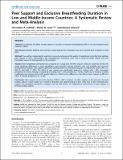| dc.contributor.author | Sudfeld, Christopher Robert | |
| dc.contributor.author | Fawzi, Wafaie W. | |
| dc.contributor.author | Lahariya, Chandrakant | |
| dc.date.accessioned | 2013-04-25T18:44:23Z | |
| dc.date.issued | 2012 | |
| dc.identifier.citation | Sudfeld, Christopher R., Wafaie W. Fawzi, and Chandrakant Lahariya. 2012. Peer support and exclusive breastfeeding duration in low and middle-income countries: A systematic review and meta-analysis. PLoS ONE 7(9): e45143. | en_US |
| dc.identifier.issn | 1932-6203 | en_US |
| dc.identifier.uri | http://nrs.harvard.edu/urn-3:HUL.InstRepos:10587995 | |
| dc.description.abstract | Objective: To examine the effect of peer support on duration of exclusive breastfeeding (EBF) in low and middle-income countries (LMICs). Data Sources Medline, EMBASE, and Cochrane Central Register for Controlled Trials were searched from inception to April 2012. Methods: Two authors independently searched, reviewed, and assessed the quality of randomized controlled trials utilizing peer support in LMICs. Meta-analysis and metaregression techniques were used to produce pooled relative risks and investigate sources of heterogeneity in the estimates. Results: Eleven randomized controlled trials conducted at 13 study sites met the inclusion criteria for systematic review. We noted significant differences in study populations, peer counselor training methods, peer visit schedule, and outcome ascertainment methods. Peer support significantly decreased the risk of discontinuing EBF as compared to control (RR: 0.71; 95% CI: 0.61–0.82; I2 = 92%). The effect of peer support was significantly reduced in settings with >10% community prevalence of formula feeding as compared to settings with <10% prevalence (p = 0.048). There was no evidence of effect modification by inclusion of low birth weight infants (p = 0.367) and no difference in the effect of peer support on EBF at 4 versus 6 months postpartum (p = 0.398). Conclusions: Peer support increases the duration of EBF in LMICs; however, the effect appears to be reduced in formula feeding cultures. Future studies are needed to determine the optimal timing of peer visits, how to best integrate peer support into packaged intervention strategies, and the effectiveness of supplemental interventions to peer support in formula feeding cultures. | en_US |
| dc.language.iso | en_US | en_US |
| dc.publisher | Public Library of Science | en_US |
| dc.relation.isversionof | doi:10.1371/journal.pone.0045143 | en_US |
| dc.relation.hasversion | http://www.ncbi.nlm.nih.gov/pmc/articles/PMC3445598/pdf/ | en_US |
| dash.license | LAA | |
| dc.subject | Medicine | en_US |
| dc.subject | Epidemiology | en_US |
| dc.subject | Clinical Epidemiology | en_US |
| dc.subject | Pediatric Epidemiology | en_US |
| dc.subject | Global Health | en_US |
| dc.subject | Non-Clinical Medicine | en_US |
| dc.subject | Evidence-Based Medicine | en_US |
| dc.subject | Nutrition | en_US |
| dc.subject | Public Health | en_US |
| dc.subject | Child Health | en_US |
| dc.subject | Preventive Medicine | en_US |
| dc.subject | Women's Health | en_US |
| dc.title | Peer Support and Exclusive Breastfeeding Duration in Low and Middle-Income Countries: A Systematic Review and Meta-Analysis | en_US |
| dc.type | Journal Article | en_US |
| dc.description.version | Version of Record | en_US |
| dc.relation.journal | PLoS ONE | en_US |
| dash.depositing.author | Fawzi, Wafaie W. | |
| dc.date.available | 2013-04-25T18:44:23Z | |
| dc.identifier.doi | 10.1371/journal.pone.0045143 | * |
| dash.contributor.affiliated | Fawzi, Wafaie | |
| dash.contributor.affiliated | Sudfeld, Christopher | |


